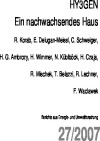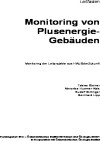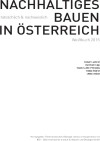Suchergebnisse für "Factsheet: Energietechnologien gestalten, die für alle sinnvoll und nutzbar sind"
HY3GEN

Ein nachwachsendes Haus
Schriftenreihe
27/2007
R. Korab, E. Delugan-Meissl, C. Schweiger, H. G. Ambrozy, H. Wimmer, N. Küblböck, H. Czaja, R. Mischek, T. Belazzi, R. Lechner, F. Waclawek
Herausgeber: Bundesministerium für Verkehr, Innovation und Technologie
Deutsch, 186 Seiten
Downloads zur Publikation
Chemo-physical analysis and assessment of color alterations of selected hardwoods and development
Analyses of biochemical reactions causing colour changes during the hygrothermal treatment of selected hardwoods will lead to a model for defined and process-based colouration or maintenance of colour in drying and steaming processes. Based on this development the new drying and steaming schedules will be implemented in the industry.
Feasibility concept for the extensive implementation of information systems on Geographic basis in forest associations
The introduction of spacious information systems on GIS basis (geographical information system) in the forest federations of Austria and Bavaria is examined. This offers for the first time the possibility to connect biological and technical characteristics (attributes) with geographical data to compensate for the disadvantages of small structured forest estates. A substantial goal is also the development of a scanner method for the automated, EDP-supported identification of forests and their most important ground and stock characteristics.
IEA EBC Annex 55: Reliability of Energy Efficient Building Retrofitting - Probability Assessment of Performance & Cost (RAP-RETRO)
The scope of the project is to develop and provide decision support data and tools for energy retrofitting measures. The tools will be based on probabilistic methodologies for prediction of energy use, life cycle cost and functional performance. The impact of uncertainty on the performance and costs will be considered. Methods based on probability give powerful tools that can provide us with reliable ranges for the outcome.
IEA Bioenergie Task 42 "Biorefining" Brochure 2014 jetzt online!
Report zu den Aktivitäten des IEA-Task 42 "Biorefining" mit Beiträgen aus den 11 Mitgliedsländern. Schwerpunkt liegt auf der Darstellung von 30 Beispielen zu Bioraffinerien in den Mitgliedsländern sowie der Klassifizierungsmethode von Bioraffinerien, der Nachhaltigkeitsbewertung und dem "Biorefinery Fact Sheet"
Thermo-Active Building Systems - Development of a Calculation kernel (TBA-CALC )
This project result will provide Austria with a uniform software environment for the simulation of thermo-active building systems in the form of a validated tool.
Earthen building 2.0: Earthen building of the future - The art of craftsmanship based on engineering approaches
The exploratory project investigates the suitability of fiber optic sensors for the long-term monitoring of the deformation behavior of rammed earth wall elements under moisture and temperature fluctuations (shrinkage) as well as loads (creep). The experimental findings will be integrated into a finite element model to simulate failure behavior under load.
StirliQ+ Component development of the expansion Stirling generator with supercritical fluid as working & lubrication medium
Technical research and further development of details or components of the novel StirliQ engine, which has the potential to overcome the technical hurdles of conventional Stirling engines. On the basis of simulations as well as a laboratory plant, a narrowing down of the process parameters with regard to a resilient pre-dimension of apparatus components is carried out.
Klimagärten³ - Biodiverse, CO2-saving, close to nature: climate gardens³ for Austria's garden future
The Klimagärten³ project is dedicated to the climate-friendly design of gardens and green spaces in Austria. The focus is on activating the previously untapped climate protection potential of private and public gardens. Through research, practical trialling and social networking, ways are shown in which gardens can act as CO₂ sinks and strengthen biodiversity.
IntEGrity - Integration and Diffusion of Energy Communities
IntEGrity aims at fully integrating energy communities in the existing energy landscape in order to push for efficient diffusion and to use the potential of the positive contribution to energy awareness, efficiency and climate neutrality. In order to fully enable integration, the project explores innovative developments on three levels - social level, energy community level and service level.
MasSan - Feasibility study of serial renovation concepts & models in Austria
Feasibility study to present and analyze the framework conditions and potential of serial renovations of large-volume buildings. The findings from the national pilot projects as well as the international / German projects and models are extracted and checked for their feasibility in the Austrian context and the requirements are prepared.
BIOCHARm - Assessing the Potential of Biochar in Construction as a Contribution to Climate Neutrality
The project investigates the potential and limits of the use of biochar in the Austrian construction sector. The participating organisations gain valuable insights into the availability and suitability of biogenic material flows, the possible uses of biochar and the possibility of storing atmospheric carbon in the construction sector.
Linz with Ambitio3xn - Linz with ambition for climate neutrality: governance, infrastructure and climate-social neighborhood Franckviertel
The project "Linz with Ambitio3xn" supports the city of Linz in becoming climate neutral by 2040. Contributing to this ambitious goal requires aligning urban planning instruments with urban climate mitigation and decarbonizing existing gas infrastructure in the Franckviertel neighborhood. In the project, standards for net zero non-profit housing will be tested in practice and shared learning are promoted.
Monitoring von Plusenergie-Gebäuden - Leitfaden (Nov. 2014)

Monitoring der Leitprojekte aus Haus der Zukunft
Tobias Steiner, Veronika Huemer-Kals, Rudolf Bintinger, Bernhard Lipp
Herausgeber: IBO - Österreichisches Institut für Bauen und Ökologie GmbH in Kooperation mit Österreichisches Ökologie-Institut
Deutsch, 74 Seiten
Downloads zur Publikation
Nachhaltiges Bauen tatsächlich & nachweislich in Österreich - Weißbuch 2015 (Nov. 2014)

Robert Lechner, Bernhard Lipp, Beate Lubitz-Prohaska, et al.
Herausgeber: Österreichisches Ökologie-Institut in Kooperation mit IBO - Österreichisches Institut für Bauen und Ökologie GmbH
Deutsch, 104 Seiten
Downloads zur Publikation
IEA SHC Task 55: Newsletter Februar 2017

Der Newsletter informiert über das geplante 2. IEA SHC Task 55 Meeting.
Putz, Sabine; Provasnek, Anna Katharina
Englisch
Downloads zur Publikation
INTOKI- Methods and tools for consumers' and stakeholder involvement in the development of sustainable products and services
Supporting SME bakeries in the involvement process of their stakeholders in sustainability oriented product service innovation processes. Development and pilot testing of a dialogue oriented toolkit ("The INNOVATIVE Bakery Dialogue" Handbook).
Interregional Logistics- and Procurement Network for Forest Fuel in Austria
A concept for a cooperative forest fuel supply chain network for a large part of Austria (regions of Salzburg, Upper Austria, Lower Austria, Vienna) is developed in order to minimise transport-, storage- and total system costs while simultaneously increasing supply guarantee for the plants.
"Building of Tomorrow" on the road - knowledge transfer of the results from "Building of Tomorrow" to existing traineeships
Knowledge transfer of the programme "Building of Tomorrow" to specialists on universities, advanced technical colleges, polytechnics, construction academies, administration academies. Themes: Energy, Construction and Building Physics, Ecology and Architecture and Sociology.
Smart Dag - smart and climate-neutral renovation of the Dag Hammarskjöld housing estate
For a smart and sustainable renovation of the Dag Hammarskjöld housing estate in the city of Klagenfurt, a residential area from the 1950/1960s, the existing housing stock (buildings, green and open space, social structure) will be analysed and assessed based on the "Quartier &Wir" guide. The results are the basis for the launch of an architectural competition. The residents of the area who still live on site and the housing development agency of the department of the provincial Carinthian Government are involved in the feasibility study. The aim is to transfer the results of the study to other renovation projects and thus contribute to achieving the city of Klagenfurt's climate goals.
